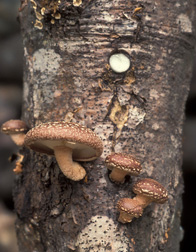Habitat | Adaptations | Nutrition | Reproduction | Interactions | Interesting Facts & About Me | Sources
Shiitake Mushroom (Lentinula edodes)- the "Fun-Guy" at the Party
OverviewLentinula edodes, commonly known as the Shiitake Mushroom, is the world's second most cultivated mushroom (next to button mushrooms). This edible mushroom from eastern Asia, mainly China and Japan, is not restricted to just culinary uses, but studies have shown for it to have positive effects on human health as well. With the history of the Shiitake mushroom dating back to the Ming Dynasty, it's no wonder its popularity is still existent today.
|
An interesting thing to note about the Shiitake mushroom and other fungi is that they are more closely related to animals than plants. This close relationship stems from them both being able to store food by synthesizing glycogen. Plants on the other hand synthesize starch. Their closest living relatives are Microsporidia which are unicellular parasites. |
ClassificationDomain: Eukarya ~nucleus, cytoskeleton, membrane-bound organelles Kingdom: Fungi ~heterotrophic and absorbent Phylum: Basidiomycota ~form basidia Class: Hymenomycete ~basidiospores germinate to form mycelium, club-shaped single celled basidium, Order: Agaricales ~moist to dry surface, gills from white to grey-pink, white to grey-brown cap, flattened scales on cap Family: Tricholomataceae ~separate group due to the fact that they do not share any characteristics with other Agaricales Genus: Lentinula ~smooth spores, tough flesh, appear on wood, "saw-tooth" edges on cap Species: L. edodes ~mushroom found in East Asia |


